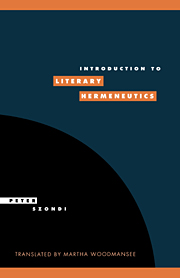Book contents
- Frontmatter
- Contents
- Foreword by Joel Weinsheimer
- Translator's preface
- Chapter 1 Introduction
- Chapter 2 Chladenius, I
- Chapter 3 Chladenius, II
- Chapter 4 Chladenius, III
- Chapter 5 Chladenius, IV
- Chapter 6 Meier, I
- Chapter 7 Meier, II
- Chapter 8 Ast
- Chapter 9 Schleiermacher, I
- Chapter 10 Schleiermacher, II
- Afterword by Jean Bollack
- Index
Chapter 4 - Chladenius, III
Published online by Cambridge University Press: 14 December 2009
- Frontmatter
- Contents
- Foreword by Joel Weinsheimer
- Translator's preface
- Chapter 1 Introduction
- Chapter 2 Chladenius, I
- Chapter 3 Chladenius, II
- Chapter 4 Chladenius, III
- Chapter 5 Chladenius, IV
- Chapter 6 Meier, I
- Chapter 7 Meier, II
- Chapter 8 Ast
- Chapter 9 Schleiermacher, I
- Chapter 10 Schleiermacher, II
- Afterword by Jean Bollack
- Index
Summary
Chladenius is true to the postulates of the psychology of reception when he defines “complete understanding” by saying “a speech or written text [is understood] completely when one thinks of all the things which the words can awaken in us” (§155, p. 86). That this psychology of reception is also a true child of the Enlightenment is shown by the qualification he builds into the definition: “in accordance with reason and the rules governing the soul.” However, such a conception of the meaning of a passage or text is not easily reconciled with the claim so characteristic of rationalism that words “nevertheless have their certainty of meaning, even if they at first appear to be ambiguous when one considers the passage only superficially” (§750, P. 595). This claim in turn implies that “interpretations have their certainty” too (§751, p. 596). But certainty cannot emerge as long as “meaning” is construed as the totality of thoughts awakened in the reader. Such thoughts exhibit a multiplicity that is individually as well as historically determined. The logical contradiction arises from Chladenius' insight that passages can also mean things which did not “enter the mind” of the author (§156, p. 87), together with the claim that certainty derives from what the author intended. This contradiction between the claims of the psychology of reception and those of rationalism is reflected in Chladenius' division of “complete meaning” into: a straightforward sense, a mediated sense, i.e., an application, and finally digressions, which do not share equal status with one another.
- Type
- Chapter
- Information
- Introduction to Literary Hermeneutics , pp. 40 - 52Publisher: Cambridge University PressPrint publication year: 1995

